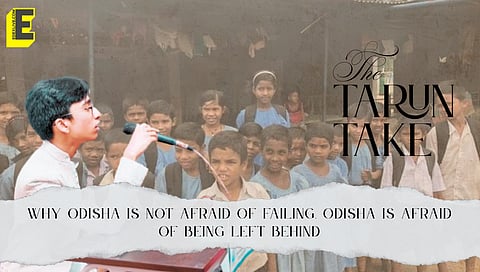

This Wednesday, my phone buzzed with a headline that gave me a little jolt: “Odisha Govt brings back fail system in Classes V and VIII.”
My first thought? So this is real now. No more automatic promotion. From this academic session, if we don’t pass our final exams in Class V or VIII, we will stay back. Just like that.
I’m one of the lucky ones, have gone to private CBSE schools all my life, but I have plenty of friends in State Boards from competitions, who are just as talented, if not more, and I couldn’t help but think, is this policy something to reintroduce systematic educational change or strictness veiled under meritocracy?
As a Class XII student myself, I’m still trying to digest what this actually means for my juniors. I cannot help but question is backlogging a child’s education in the middle-school or elementary level, really necessary.
While the NEP transitions into an era where students can navigate their syllabi with ease and without fear of ramifications, without compartmentalising, where does Odisha stand in the national conversation?
According to the government’s notification, if one fails in the annual exams, one’ll get remedial instruction and a second chance to clear a re-exam within two months. But if we fail again, we repeat the whole year.
“We won't be expelled, which is a relief, but let's be honest: staying back feels like a social punishment more than anything else,” said my friend, Somiranjan Behera of Chanakya Higher Secondary to me in Odia.
As I have analysed it, the fear isn't just about failing. It's about falling behind while everyone else moves forward.
In a universe where IGCSE and IBCP students take Physics with Dance and Political Science with Econometrics, students are being forced to pause education for an entire academic session. We must ask, at what cost?
When I shared the news with my parents, my mother nodded quietly, saying, “Maybe this will finally make schools and lenient students take teaching seriously.”
My father, on the other hand, sighed. “But will they fix the reason children fail in the first place?” he asked.
And Dad’s question has been stuck in my head ever since. If the pass percentage of the State Board is so detrimental that students cannot help but fail due to gaps in pedagogy, is it a macro-problem of the education implementation? If so, why should the lone student from Bolangir or Kandhamal pay the toll?
Yes, I get it.
The state has amended the Odisha Right of Children to Free and Compulsory Education Rules, 2010, following the Centre’s 2019 update to the RTE Act. The goal is probably to improve academic discipline and accountability.
But are we confusing pressure with progress?
Some of them study in government schools that still don’t have enough teachers, proper blackboards, working toilets or functioning libraries.
Even when they attend school regularly, the quality of teaching is inconsistent. How fair is it to ask them to pass — or be left behind — when the system itself hasn’t caught up?
Let’s not forget: the old 'no-detention policy' wasn’t introduced just to make life easy for students.
It came from the understanding that fear of failure pushes kids — especially from poorer families — out of the school system altogether. Bringing back the fail system might push us harder to study, but it could also push some of us out of school for good.
I know there are two sides to this. Some of my classmates say this will finally make students focus more, and that maybe we need this kind of seriousness before we step into high school. But I worry about what it will do to a student’s confidence when they’re told they’re not “good enough” — twice.
What we need right now is not just exams, but empathy. If this new rule is here to stay, then so must stronger support systems: more teachers, better classrooms, after-school help, and above all, the message that failing once doesn’t mean you're a failure.
So here I am, gearing up for my Class XII finals, in the plush comfort of CBSE, and there is a CHSE student in Mayurbhanj more anxious than ever. But also more determined — not just to pass, but to prove that with the right help, every child can rise.
Not just the ones who don’t fail, but even the ones who do. Perhaps, the cornerstone of the Indian education system seems not to progress but to push. Is that the legacy we aspire to? That question, dear reader, I leave to you.
(Tarun Tapan Bhuyan is a student of SAI International School. Views expressed are his own.)
